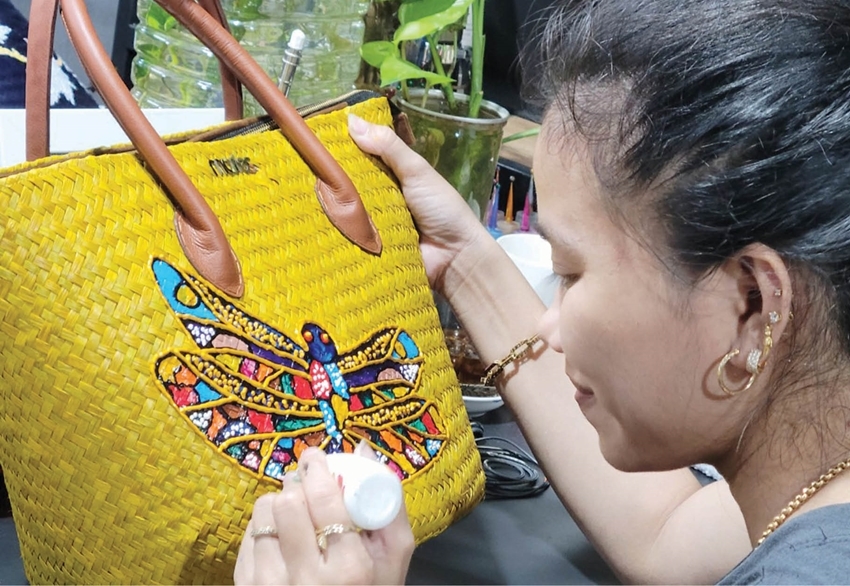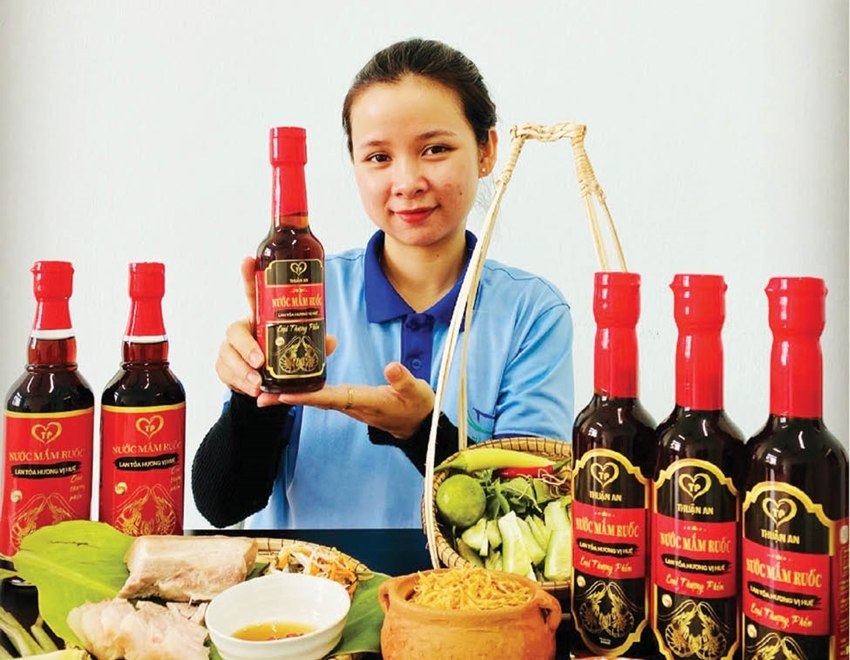 |
| Adding designs to Lepironia grass bags |
Preserving the passion of traditional crafts
Pho Trach Village, Phong Binh Commune (Phong Dien District), is renowned for its centuries-old tradition of Lepironia grass weaving. However, due to the lack of sophistication in materials, designs, and networking, products have remained confined within the village and the commune.
Embarking on a startup in tourism, fate led Ms. Ho Thi Suong Lan, Director of Phong Lan Viet Tourism Company Limited, to the fashion product line made from Lepironia grass in 2021, when tours were temporarily cancelled due to COVID-19. Upon exploring the distinctive cultural features of grass weaving, witnessing the meticulous care and dedication of the artisans, and feeling the texture of each strand of Lepironia grass, her love and passion for natural materials compelled her to “expand” into producing fashion products made from Lepironia grass.
“With a market of nearly 100 million people and an endless passion for handbags, hats, and caps... for women, it motivates me to invest in researching customers to create beautiful, modern fashion products from Lepironia grass under the Maries brand name,” shared Ms. Ho Thi Suong Lan, Director of Maries Company Limited (shortened as Maries).
As an enterprise that follows the path of Lepironia grass as its production material, Maries does not follow the conventional path of “importing from local residents, processing technically, and adding designs” to bring products to the market. Maries' approach to building its brand name involves creating connections between businesses, craft villages, and people through establishing on-site ecosystems, training farmers on material selection and preservation, and collaborating with experienced artisans to produce raw products. From raw products, the company continues to collaborate with weaving villages, hat-makers, and artists to perfect the products.
“To attract customers, Maries identifies painting as its focal point in traditional products when introducing them to the market. Any craft village can produce a pure weaving product, but incorporating contemporary and artistic elements requires the talented hands of both the artisans and painters,” explained Ms. Suong Lan.
Through the connection between businesses and craft village residents and artisans, in the past 2 years, Maries has supplied over 50 thousand products to the market; its production capacity is over 2,000 items per month, and consumption capacity is about 1,000 items per month, creating jobs for nearly 60 workers.
 |
| Tourists taking souvenir photos in the incense village of Thuy Xuan |
Connecting craft villages with tourism
Thuy Xuan incense craft village (Thuy Xuan Ward, Hue City) was previously only a place to produce incense to supply to local people. After Hue City renovated Vong Canh hill and its surrounding areas, establishments have started to renovate their shops and invest in additional services such as renting traditional five-flap ao dai for tourists to take souvenir photos, which lead to the attraction of a significant number of tourists.
“Connecting craft villages and tourism not only brings economic benefits and income but also creates a brand name for craft village products. From being a common item, products like agarwood incense, cinnamon incense... now accompany domestic and international tourists,” shared Ms. Nguyen Thi Bich, a resident of the craft village.
The number of tourists visiting Hue, combining sightseeing, researching, learning about craft villages, and purchasing souvenir products, is increasing. There are many options for tourists when visiting craft villages, such as experiencing the production process, participating in craft demonstrations, and buying souvenirs… Consequently, many shops selling and organizing craft demonstrations have emerged in tourist areas and central routes, forming a supply chain of craft village products.
To utilize its potential and strengths, the Provincial People's Committee has recently developed an overall plan for craft village tourism closely linked with general tourism development and the rural industry development. Moreover, efforts have been made to promote market development, tourism promotion, brand building, leading to the formation and attraction of craft village tourism tours such as: paper flowers in Thanh Tien, bamboo and rattan in Bao La, pottery in Phuoc Tich, and Lepironia grass weaving in Pho Trach.
 |
| Hue specialties always attract tourists |
Building supply chain
In addition to connecting businesses and craft villages and connecting craft villages with tourism, building supply chains to enhance the value of production and consumption are problems being tackled by many businesses and craft villages.
In the story of connecting to expand the reach of craft village products, Ms. Ho Thi Suong Lan believes that the synergy between craft villages not only creates a perfect product but also elevates the brand name, increasing the value and essence of the artisans. To harness the capabilities of craft villages, collaboration and connections across numerous craft villages are required to develop tours to create attractiveness and attract tourists.
Recently, the Department of Industry and Trade has implemented many solutions to promote production and consumption towards a product life cycle approach and enhance connectivity in all stages, from resource management and materials to production, distribution, and consumption. To maintain and develop traditional crafts, the industrial promotion program has provided nearly 2 billion VND/year to equip advanced machinery, establish exhibition houses, introduce and promote products, etc., for establishments. As a result, the consumption market is constantly expanding, contributing to job creation and stable income for people to achieve the goal of conserving and developing traditional crafts and craft villages.